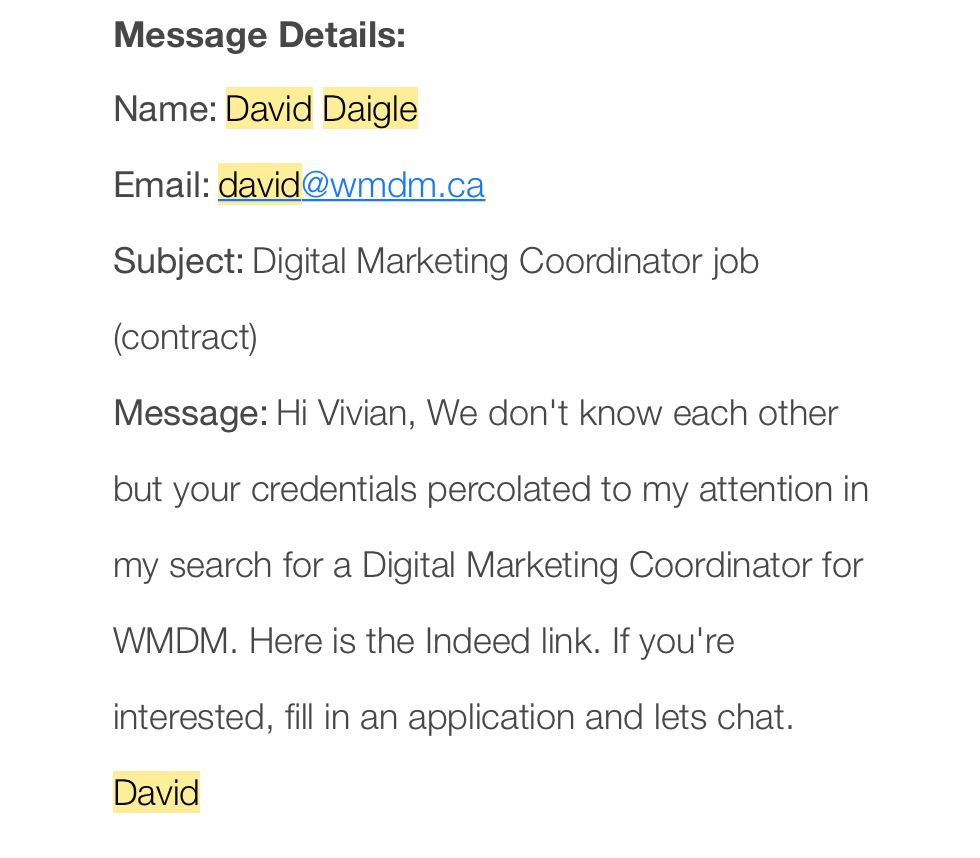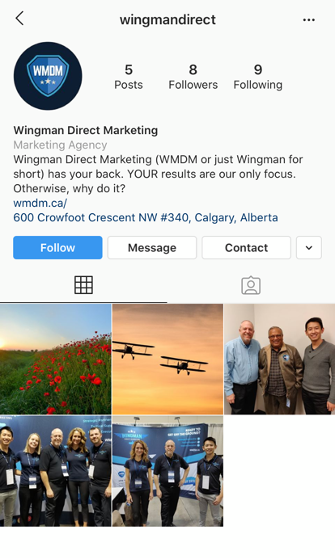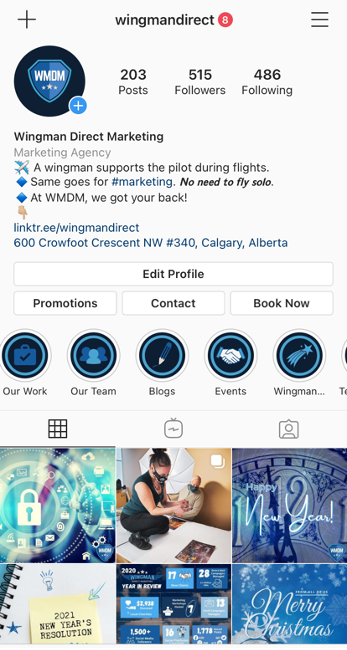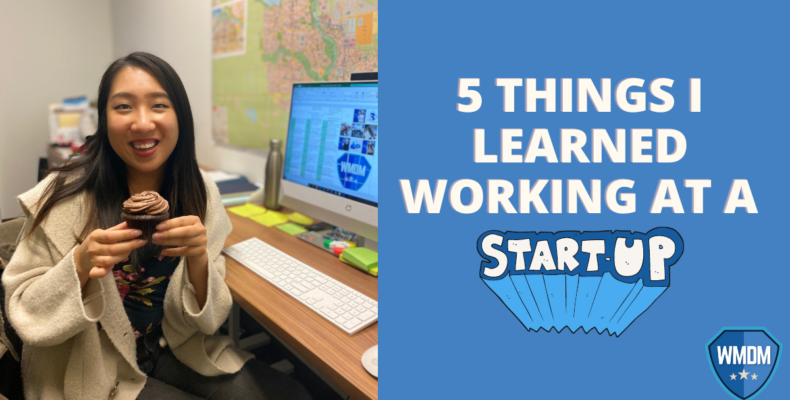By Vivian Lee, Social Media Marketing Lead at Wingman Direct Marketing (WMDM)
Today is my last day at WMDM.
In November 2019, I received an email from someone named David Daigle, asking if I was interested in a Digital Marketing position at WMDM. I wasn’t familiar with WMDM at the time, and an initial Google search led me to a radio station in Maryland called WMDM. After diving a little deeper, I soon realized that this was a marketing agency – a startup.

As a marketing major who was seeking employment in the field, I didn’t hesitate to go in and interview for the role – which I ended up landing.
What was meant to be a 4-month contract turned into 13 months.
As a new graduate, my time at Wingman was my first full-time, non-internship job. It was also the first startup I had ever worked at. When I joined the organization, the only employees were David (our Crew Chief) and Kevin (our Digital Lead), squished into one small room that was our office. It was a humbling experience, having interned at bigger agencies and corporations prior. However, I quickly learned that working at a startup was incredibly rewarding in ways that those other larger companies were not able to offer.
Here are 5 things I learned from working for a startup:
1. Take initiative.
Working at a startup, you aren’t going to be told exactly what you need to do, or how to do it. Your role isn’t clearly defined with a formal onboarding process in place, like you would find at a big corporation. It is up to you to shape your role and figure out how you are going to contribute to the organization.
When I first joined the team, I quickly noticed a gap in the social media department. It became clear that I had the most experience in corporate social media management, so I took on the role of “social media manager” and made it my goal within that first week to re-vamp Wingman’s social media pages and elevate our digital presence. I introduced Instagram stories to Kevin and David and developed a more structured social media calendar and process to organize Wingman’s posts.
Here’s what Wingman’s Instagram looked like when I first joined in November 2019:

Here’s what Wingman’s Instagram looks like as of January 6th, 2021:

In my previous social media-focused roles, I entered the organization with pre-existing social media guidelines in place and simply executed what I was told to do, so it was rewarding to have the freedom to build Wingman’s and our clients’ social media presences from a blank slate.
The takeaway: You aren’t constricted to a certain role or responsibility in a startup. Identify gaps in the business and take the steps to solve them!
2. Don’t be afraid to ask questions or speak up.
In my previous roles, I was often afraid to ask questions or speak up with my concerns or opinions, because I was “just an intern.” Working for a startup like Wingman, I learned that my perspective was just as valued as anyone else’s. I was hired for a reason, so if I had an idea for improvement or a concern, I needed to speak up about it and give my reasoning. At a startup, the chain of command or hierarchical structure is not as important as getting all ideas out there and listening to everyone in the company, regardless of their role.
The takeaway: Never hesitate to make yourself heard but be prepared to defend your ideas.
3. Don’t get stuck in your idea.
Following up from point #2, I also learned to not get stuck in my opinions. Something I struggled with throughout the first half of my term at Wingman was change. Once my monthly social media calendars had been approved by the client, I viewed them as set-in stone. If any last-minute changes arose, I would get frustrated with the idea of having to “shift” around the entire calendar to accommodate the request. Over time, I learned that with any client-facing role, last-minute requests and changes are inevitable. I learned to become more flexible with my work and leave room to move things around as per the requests of my clients or coworkers.
The takeaway: Be open to new ideas from others who have diverse backgrounds and perspectives from you.Step back and view things from the bigger picture, to understand why certain decisions and changes are being made. There is always a reason, and you can learn from it!
4. Learn to work with different types of people.
Wingman was my first client-facing role, and I had to quickly learn how to work with different types of people and personalities.
- We have clients who are goal-oriented, results-driven, and don’t beat around the bush. They expect direct solutions to their problems and clear steps on how to achieve those results.
- On the other end of the spectrum, we have clients who are relationship-oriented, thrive on small talk, and are open to new ideas and experimentation.
As a result, I learned that you cannot take the same approach when talking with a client. In both marketing and life in general, it’s important to understand who you are talking to, embrace their differences, and learn how to cater to their concerns.
- With the goal-oriented clients, I’ve learned to be confident and straightforward in the manner that I speak to them, and come to meetings prepared with facts, solutions, rationales, and steps on how to achieve those goals.
- With the relationship-oriented clients, I’ve learned to focus on building a relationship with the client and getting to know them before pitching new ideas, to build a sense of trust and collaboration.
The takeaway: People skills are just as necessary as technical skills.On such a small and intimate team, social skills and being friendly to your coworkers are critical to your success.
5. Expect big ups and downs.
When big companies launch something new, or fail at something, it hardly impacts their overall revenue or makes headlines (most of the time). However, with a startup, there are big wins and losses that can swing the company in either direction. There can be zero clients when you join the startup. You can gain clients or lose clients within the span of a week or even day. Launch days for new clients can be intense and stressful. Big wins lead to growth, and big losses can lead to cut expenses and hours.
The takeaway: Working for a startup, there will be massive fluctuations as it grows. Be ready for any outcome, don’t stress too much, and just ride the waves!
In Conclusion
It’s been an amazing journey, but the time has come for me to take on a new challenge and explore other areas of marketing, media and technology. No matter where the rest of my career takes me, I’ll be sure to bring along the experiences and skills I learned at Wingman. I would like to extend one last big thank you to the team, and particularly:
- David – For trusting me with building Wingman and our clients’ social media presence from the ground up, for giving me the creative freedom to experiment with social media tactics and strategies, and for always taking my personal interests and professional goals into consideration.
- Kevin – For taking me under your wing on day 1 and showing me the foundation of Wingman that you had built with David, for teaching me the basics of SEO and digital marketing, and for always being so patient when I got frustrated or had questions.
When you google “WMDM” now, you no longer see a radio station in Maryland as the top result. Now, the top 6 results are filled with pages from our website. This is a testament to the excellent work that the Wingman team has been doing with growing our digital presence. It was an honour to be a part of the journey to get here, and I can’t wait to see what is in store for Wingman in 2021!

